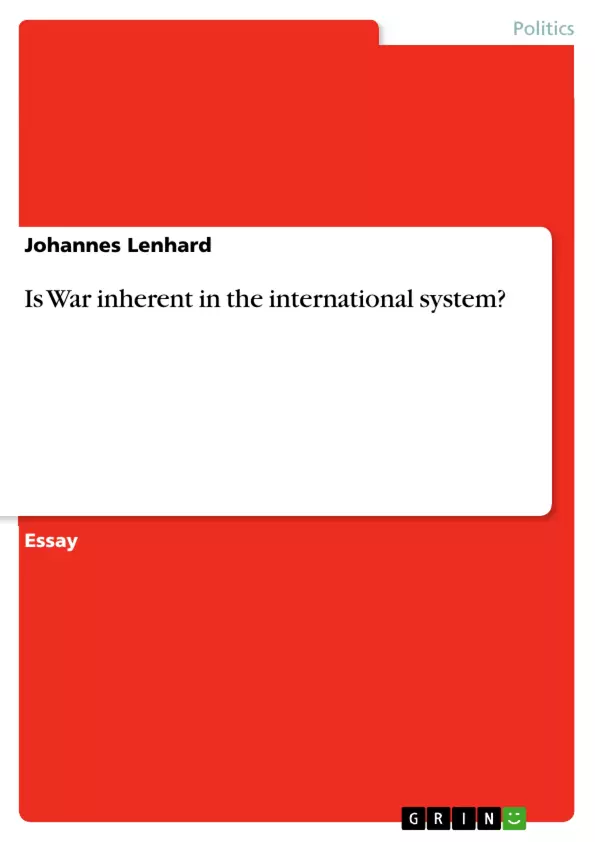War or Peace? The answer to this question is very ambiguous in classical theory; arguments laid out by both liberalists and realists are consistent although the empirical evidence so far tends to support the realist notion of perpetual conflict. Especially taking into account terrorism, intervention and intrastate conflict, a pessimistic outlook seems unavoidable. So the overwhelming empirical arguments still win the case in favour of Realism, in my opinion.
To come to this argument, the first paragraph is denoted to give definitions of the most important terms and a description of the international system. After this initial clarification, the liberal position of a possible peace defended by what can be called the ‘interconnectedness’ thesis in political, economic and institutional terms will be presented. This will then be confronted with the realist argumentation for a never-ending state of war. The last part of the paper will deal with intrastate wars, humanitarian intervention and terrorism as the ‘new threat to eternal peace’ leading to a pessimistic conclusion.
Inhaltsverzeichnis (Table of Contents)
- Introduction
- The International System
- Liberalism
- Political Ties
- Economic Ties
- Institutional Ties
- Realism
Zielsetzung und Themenschwerpunkte (Objectives and Key Themes)
This essay aims to explore the question of whether conflict is inherent in the international system. It examines the theoretical arguments of both liberalism and realism to determine whether a peaceful or conflictual international order is more likely.
- The nature of conflict and the international system
- The liberal argument for a peaceful international order based on interconnectedness
- The realist argument for a perpetual state of war driven by anarchy and self-interest
- The role of intrastate wars, humanitarian intervention, and terrorism in shaping the international system
- The empirical evidence supporting either a peaceful or conflictual international order
Zusammenfassung der Kapitel (Chapter Summaries)
The essay begins by defining key terms such as conflict, the international system, and the Westphalian order. It then presents the liberal perspective on international relations, highlighting the interconnectedness thesis and its arguments for political, economic, and institutional ties as promoting peace. The essay examines the historical evidence, including examples such as the League of Nations and the European Union, in relation to these arguments. The next section delves into the realist perspective, outlining the theories of anarchy, self-interest, and the pursuit of power as driving forces behind conflict. The essay concludes by considering the role of intrastate wars, humanitarian intervention, and terrorism as contemporary challenges to the potential for a peaceful international order.
Schlüsselwörter (Keywords)
The main keywords and concepts explored in this essay include: international system, conflict, anarchy, liberalism, realism, interconnectedness, self-interest, power, peace, war, intrastate conflict, humanitarian intervention, and terrorism.
Frequently Asked Questions
Is war considered inherent in the international system according to this essay?
The essay argues that while liberal theories offer hope for peace, empirical evidence regarding terrorism and intrastate conflict currently supports the realist notion of perpetual conflict.
What is the "interconnectedness" thesis in Liberalism?
It is the idea that political, economic, and institutional ties between nations create a level of interdependence that makes peace more beneficial than war.
What are the core arguments of Realism regarding war?
Realists argue that the international system is anarchic, leading states to act out of self-interest and power-seeking, which inevitably results in a state of conflict.
How do "new threats" like terrorism change the outlook for eternal peace?
Modern phenomena like terrorism, humanitarian interventions, and intrastate wars complicate traditional state-level peace theories and lead to a more pessimistic outlook.
What historical examples are used to evaluate these theories?
The essay references the Westphalian order, the League of Nations, and the European Union to test the validity of liberal and realist arguments.
- Citation du texte
- Johannes Lenhard (Auteur), 2010, Is War inherent in the international system?, Munich, GRIN Verlag, https://www.grin.com/document/146995



